Two Dozen Dead As Thousands Renew Iraq Anti-government Protests
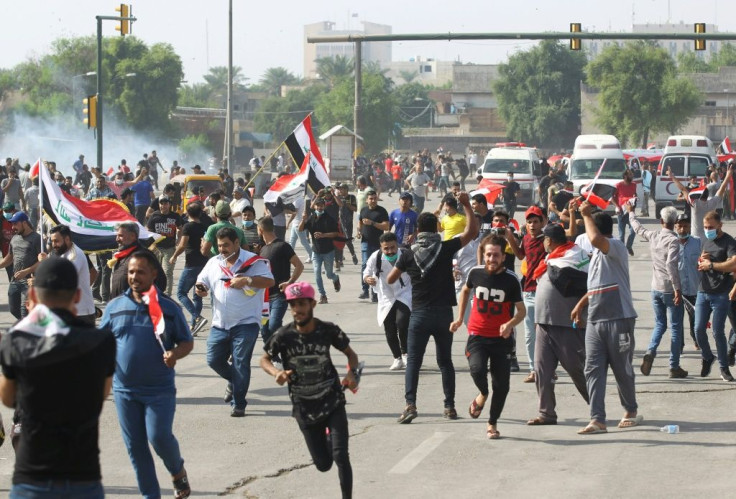
Two dozen demonstrators were killed in renewed rallies across Baghdad and Iraq's south Friday by live rounds and tear gas, according to a national rights watchdog.
The protests represent a second phase of a week-long movement in early October that ended with more than 150 people dead.
Rallies had been set to resume on Friday, with a range of actors from Iraq's highest Shiite authority to the United Nations urging restraint during the second phase.
They began that way -- and ahead of schedule on Thursday evening -- with protesters exchanging flowers with security forces and the interior minister telling demonstrators that police would "protect" them.
But by Friday evening, demonstrations across the country had descended into violence that left 24 protesters dead and more than 2,000 wounded, according to the Iraqi Human Rights Commission.
Eight reportedly died in Baghdad alone, with the rest in four southern Iraqi cities.
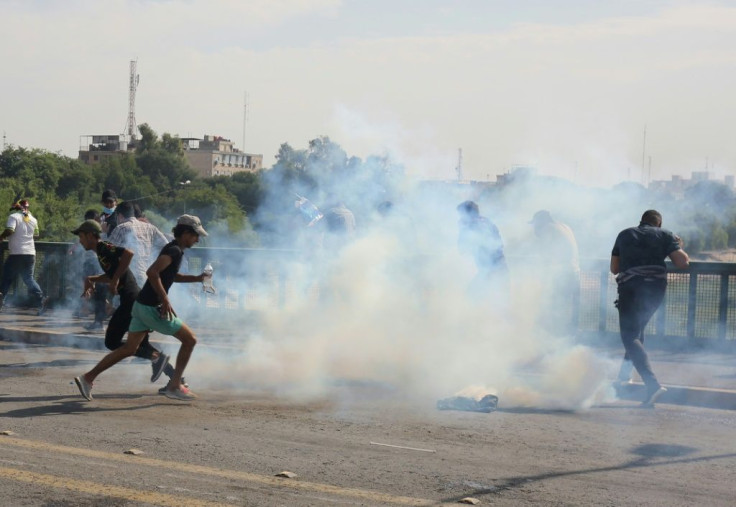
Some had been shot and others sustained wounds from tear gas fire, including from the canisters themselves.
Medical and police sources told AFP around half of those killed Friday died while trying to storm the offices of Asaib Ahl al-Haq, a powerful armed faction, in two southern cities.
Protesters also set alight more than a dozen political party centres, parliamentary offices and provincial headquarters in the south.
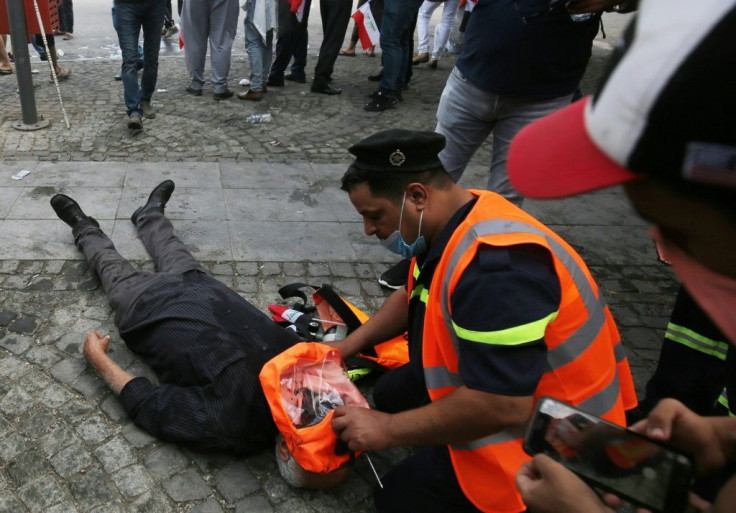
'Lying to us'
New rallies were reported in the holy city of Karbala as well as Basra, which was swept up in its own wave of protests last year over moribund public services.
Over the course of a week in 2018, outraged protesters burned government and party offices in Basra, but a swift deal between politicians and parliamentarians brought an end to that movement.
Similar grievances sparked this month's protests: one in five Iraqis still lives in poverty and youth unemployment sits around 25 percent, according to the World Bank.
The country ranks as OPEC's second-biggest oil producer -- and the 12th most corrupt nation in the world, according to Transparency International.
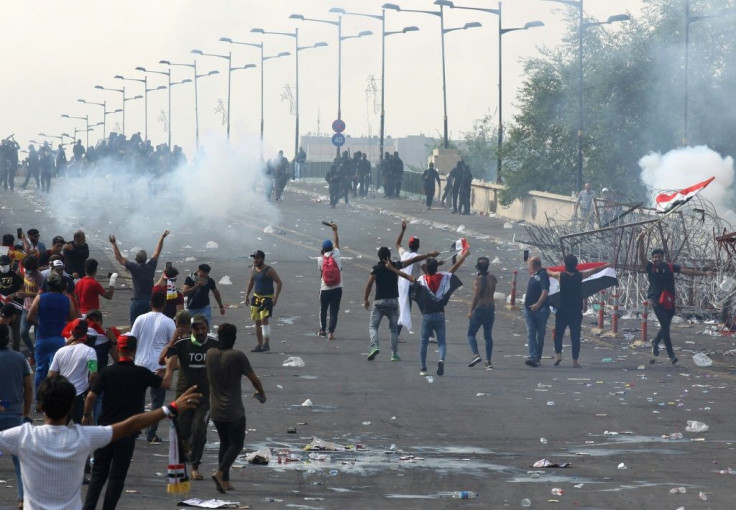
But protesters said this year's protests were unprecedented because of their independence and the violence with which they were met.
At least 157 people were killed in the first few days of October, according to a government probe, a vast majority of them protesters in Baghdad.
Activists had urged Iraqis to return to the streets on Friday to mark a year since Prime Minister Adel Abdel Mahdi came to power.
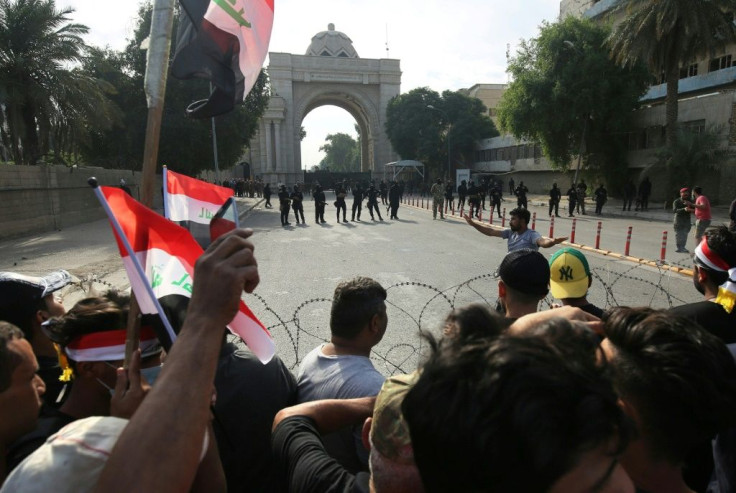
It was also the deadline set out by Iraq's top Shiite cleric, Grand Ayatollah Ali al-Sistani, for Abdel Mahdi to respond to demonstrators' demands.
In a much-awaited sermon on Friday, Sistani's representative urged protesters and security forces to show "restraint," warning of "chaos" if violence broke out again.
His sermon appeared to echo the package of reforms put forward by Abdel Mahdi, including an anti-corruption campaign, a job creation drive and improved social welfare.
But demonstrators sounded unconvinced.
"Adel Abdel Mahdi is lying to us," protesters shouted in Baghdad, just hours after the premier's televised appearance in which he defended his reform agenda.
"They are all liars -- they lie when they promise us jobs and when we protest, they fire tear gas at us!" shouted another.
Sadrists on 'high alert'
Thousands massed Friday outside Baghdad's Green Zone, which hosts government offices and foreign embassies, but security forces used a volley of tear gas to push them back.
The enclave had been opened to the public for several months under Abdel Mahdi in response to the improving security situation across the country.
But security was beefed up again when protesters began gathering earlier this month at Baghdad's iconic Tahrir (Liberation) Square, which lies across a key bridge from the Green Zone.
In 2016, supporters of firebrand cleric Moqtada al-Sadr breached the area in response to his calls to hit the streets.
Sadr, an influential ex-militiaman who controls the largest parliamentary bloc, has thrown his weight behind the recent protests.
This week, he even instructed members of his own paramilitary force to be on "high alert," and they could be seen in parts of Baghdad on Friday in a clear show of force.
Other paramilitaries have backed the government, including the powerful Hashed al-Shaabi force whose political branch is the second-largest parliamentary bloc.
Iraq's mostly-Kurdish north has stayed silent, as has the Sunni west, in fear of being branded "terrorists" for opposing the government.
The country has been ravaged by decades of conflict that finally calmed in 2017 with a victory declared over the Islamic State group.
Thus began a period of relative calm, with security forces lifting checkpoints and concrete blast walls and traffic choking city streets at hours once thought too dangerous.
But in response to protests, authorities have shut roads and imposed curfews and an internet blackout, which has been mostly lifted although social media remains blocked.
© Copyright AFP 2024. All rights reserved.





















